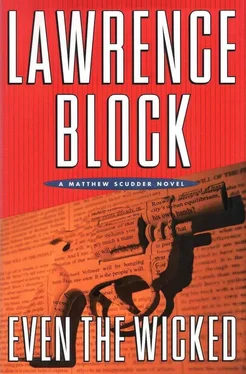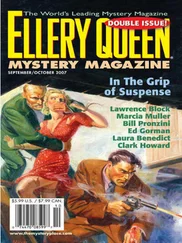There were more than a few people who claimed to be Will, and tried to take credit for his acts. The police set up a special phone number for calls relating to the case, and they got the predictable glut of false claimants and confessors. Open letters to various citizens, purportedly by Will, flowed to the News offices in a great stream. McGraw got a couple of death threats: “An Open Letter to Marty McGraw... You started this, you son of a bitch, and now it’s your turn...” A lot of people, in public and private, were moved to guess who Will’s next target might be, and offered their recommended candidates.
Everyone was sure of one thing. There would be a third. Nobody stopped at two. One maybe, three maybe. But nobody stopped at two.
Will didn’t disappoint, although his next pick may have surprised a lot of people. “An Open Letter to Roswell Berry” was his heading, and he went on to identify the city’s leading anti-abortion activist as an unindicted murderer. “Your rhetoric has provoked violent action on the part of your followers time and time again,” Will asserted, “and on at least two occasions death has been the direct result. The bombing at the 137th Street clinic, the assassinations of the nurse and physician on Ralph Avenue, were wanton acts of murder. Both times you have talked out of both sides of your mouth, disassociating yourself from the act but all but applauding it as a means to an end, and a far lesser evil than abortion... You champion the unborn, but your interest in a fetus ends at birth. You oppose birth control, oppose sex education, oppose any social program that might lessen the demand for abortion. You are a despicable human being, and seemingly unpunishable. But no one can hold out for long against
“THE WILL OF THE PEOPLE”
Berry was out of town when the letter landed on Marty McGraw’s desk. He was in Omaha, leading a massive protest against an abortion clinic. “I am doing God’s work,” he told the TV cameras. “It’s His will that I continue, and I’ll stack that up against the so-called will of the people any day.” He told another interviewer that whatever business Will had with him would have to wait until he returned to New York, and he expected to be in Omaha for some time to come.
God’s will. In AA, we’re advised to pray only for knowledge of His will, and the power to carry it out. My sponsor, Jim Faber, has said that it’s the easiest thing in the world to know God’s will. You just wait and see what happens, and that’s it.
It may indeed have been God’s work that Roswell Berry was doing, but it evidently wasn’t God’s will that he continue. He stayed in Omaha, just as he said he would, but when he returned to New York it was in a box.
The maid found him in his room at the Omaha Hilton. His killer, not without a sense of humor, had left him with a coat hanger wrapped around his neck.
It was the Omaha Police Department’s case, of course, but they welcomed the two NYPD detectives who flew out to consult with them and exchange information. There was no evidence to link Berry’s murder with the killings of Vollmer and Salerno, none aside from Will’s having singled him out in his open letter, and this left room for speculation that some native Omahan, spurred perhaps by Will’s suggestion, had handled the matter on a local level.
Will’s next communication — sent, like all the others, to Marty McGraw — addressed that notion. “Did I go off to Omaha to settle accounts with Mr. Berry? Or did some citizen of Omaha, outraged at having to put up with Roswell Berry’s disruption of that fair city’s urban equilibrium, take matters into his own hands?
“My friend, what on earth does it matter? What difference can it possibly make? I myself am nothing, as someone is purported to have said in a slightly different context. It is the will of the people that acts through me. If indeed another pair of hands than mine stuck the knife in Roswell Berry’s pitiless heart before girdling his neck with a coat hanger, it is as moot to ponder my own responsibility in the matter as it is to wonder how much your own writing gave rise to my actions. Each of us, alone or in concert, helps to express
“THE PEOPLE’S WILL”
It was cleverly done. Will wouldn’t say whether he’d gone to Omaha, arguing that it didn’t matter one way or another. At the same time, he pretty much settled the matter by alluding to the fact that Berry had been stabbed. The Omaha authorities had suppressed this. (They would have liked to suppress the coat hanger as well, but it leaked, and the symbolism was just too good to expect the press to keep it under wraps. It was easier to hold back the knife work, because it hadn’t shown up until they had Roswell Berry on the autopsy table. He’d been killed with a single stab wound to the heart, inflicted with one stroke of a narrow-bladed knife or dagger. Death was virtually instantaneous and there was no bleeding to speak of, which is why the stabbing wasn’t noticed at first, and why it managed to stay out of the papers.)
Roswell Berry had looked like a difficult target. He’d been more than halfway across the country, staying in a hotel with a good security setup, and escorted at all times by a cadre of loyal bodyguards, broad-shouldered young men in chinos and short-sleeved white shirts, with buzz haircuts and unsmiling faces. (“Thugs for Jesus,” one commentator had styled them.) There was plenty of speculation as to how Will had managed to slip through their ranks and get in and out of their leader’s hotel room.
“WILL-O’-THE-WISP?” the Post wondered on its front page.
But if Berry was a hard man to kill, Will’s next pick was clearly impossible.
“An Open Letter to Julian Rashid” was the heading on his next letter to McGraw, mailed some ten days after his ambiguous response to Berry’s death. In it, he charged the black supremacist with fomenting racial hatred for purposes of self-aggrandizement. “You have created a fiefdom of a people’s discontent,” he wrote. “Your power feeds upon the hatred and bitterness you create. You have called out for violence, and the society you vilify is at last prepared to turn that violence upon you.”
Rashid first landed in the spotlight as a tenured professor of economics at Queens College. His name back then was Wilbur Julian, but he dropped the Wilbur and tacked on the Rashid around the time he began formulating his theories. The name change was not part of a conversion to Islam, but merely represented his admiration for the legendary Haroun-al-Rashid.
His theories, which he expounded in the classroom in spite of the fact that they had little demonstrable connection to economics, contended that the black race was the original human race, that blacks had founded the lost civilizations of Atlantis and Lemuria, that it was this race of black men who were the elders revered in the prehistory of societies throughout the world. They were the builders of Stonehenge, of the heads on Easter Island.
Then white men had arisen as some sort of genetic sport, a mutation of the pure black race. Just as their skins lacked melanin, so were their spirits lacking in true humanity. Their bodies were similarly stunted; they could not run as fast or as far, could not jump as high, and lacked that primal connection to the very pulse of the earth, which is to say that they didn’t have rhythm. Perversely, however, they were able to prevail because of their inhuman nature, which led them to overwhelm and betray and subvert the black man whenever the two races met. In particular, it was a late offshoot of the white subrace whose special role it was to serve as architects of the white subjugation of the black race. These mongrel dogs at the heart of it all were, surprisingly enough, the Jews.
Читать дальше












